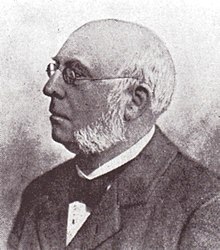Winand Nick
Winand Nick (born September 11, 1831 in Fritzlar ; † December 18, 1910 in Hildesheim ) was the cathedral music director and music teacher in Hildesheim and a productive composer who was highly regarded at the time .
Life
Fritzlar, Kassel, Fulda
Nick was born in Fritzlar in 1831. His father Johann Georg Nick was a music teacher and organist at Fritzlar Cathedral . Winand perfected himself early on in piano, violin and organ playing. At the age of nine he already represented his father on the cathedral organ. When his father died two years later, the 11-year-old took over his duties. At fourteen he moved to Kassel for further musical training , where Louis Spohr was probably one of his teachers. However, there was no money for a career in music. Therefore, a year later he entered the teacher training college in Fulda . Here Michael Henkel was his organ and composition teacher. As a participant, from 1851 as director of the performances of the Choral Society Cäcilia , he got to know the works of classical and early romantic choral music. At the same time he gave private piano and singing lessons.
In 1856 Nick applied for the vacant position of music director at Hildesheim Cathedral , which was linked to the task of singing teacher and choir director at the Josephinum grammar school . As by far the best of the six candidates, he was hired in the summer of the same year. It was probably around this time that he married his wife Ursula.
Hildesheim
In Hildesheim, Nick developed an extensive musical activity of high quality. The vocal and instrumental cathedral music with the regular performance of demanding works and the singing education of high school students, some of whom also participated in the cathedral liturgy, were his main tasks. Deviating from the rules of his time, he did not lead the cathedral choir as a boys and men, but as a mixed choir. In addition, he directed the interdenominational oratorio association and organized chamber concerts in which he participated as a pianist.
The repertoire preferred by Nick came mainly from the first half of the 19th century. In the later years of his work, under the influence of Cäcilianism, he increasingly resorted to pre-classical works. In contrast, the Viennese classics and the music of contemporaries were heard less often.
Nick has been composing since his time in Fulda. He created mainly, but not exclusively, sacred works, choral, orchestral, chamber music and songs , simple choral compositions and oratorios . His ideal was that of singing. He rejected anything violent in melody, harmony and rhythm. In this way he met with grateful approval in the music world on the one hand, and contempt and rejection on the other hand, and this all the more decisively the more the general development of music diverged from his ideal.
For five decades, Winand Nick was the central figure in Hildesheim's musical life. He is described as deeply pious and at the same time humanly attentive and helpful.
Honors and aftermath
In 1895 Winand Nick was awarded the title of professor . On the 40th anniversary of his service in 1896, he received the papal order of Gregorius on the initiative of Bishop Wilhelm Sommerwerck . His 50th service anniversary was celebrated with great festivity and numerous other honors, including the Order of the Red Eagle, 4th class. In 1914, a Winand Nick memorial was erected, but it fell victim to the bombs of March 22, 1945. In 1956 his 125th birthday was celebrated in Hildesheim with concerts and lectures. In 1962, Winand-Nick-Strasse in the Drispenstedt district of Hildesheim was named after him. In the Bernward year 1993, his Bernwards Oratorio was performed in the cathedral. Overall, however, the composer Winand Nick is largely forgotten.
The Hildesheim diocesan appendix to the praise of God from 1975 contains four melodies by him:
- 820
- 867 Holy, holy, holy, unspeakably holy
- 881 O mother my, Mary, virgin pure
- 886 Who you blind paganism (Bonifatius-Lied)
Of these, in the praise of God from 2013 (diocesan edition of the ecclesiastical province of Hamburg ), only My Jesus is not included (No. 809), but with the erroneous statement of the author " Johann Ulich 1674", which refers to the better-known melody of the Evangelical Hymn book (No. 402) relates.
literature
- Thomas Blecker, cathedral music director and high school singing teacher Winand Nick. A great musical personality in the history of Hildesheim , in: Die Diözese Hildesheim 62, 1994, pp. 267–284
- Michaela G. Grochulski: Nick, Winand. In: Biographisch-Bibliographisches Kirchenlexikon (BBKL). Volume 29, Bautz, Nordhausen 2008, ISBN 978-3-88309-452-6 , Sp. 979-988.
Web links
- Works by and about Winand Nick in the catalog of the German National Library
| personal data | |
|---|---|
| SURNAME | Nick, Winand |
| BRIEF DESCRIPTION | Cathedral Music Director; composer |
| DATE OF BIRTH | September 11, 1831 |
| PLACE OF BIRTH | Fritzlar |
| DATE OF DEATH | December 18, 1910 |
| Place of death | Hildesheim |
